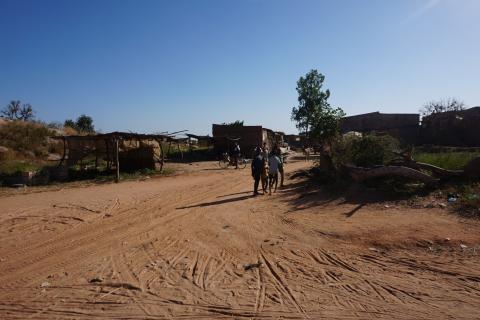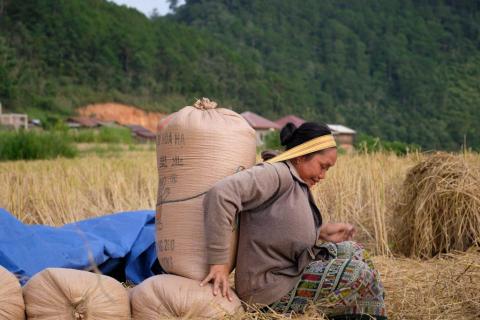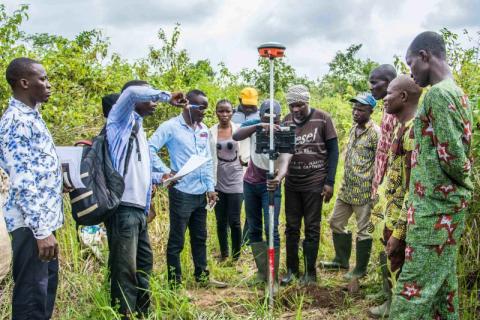Location
As a service provider in the field of international cooperation for sustainable development and international education work, we are dedicated to shaping a future worth living around the world. We have over 50 years of experience in a wide variety of areas, including economic development and employment promotion, energy and the environment, and peace and security. The diverse expertise of our federal enterprise is in demand around the globe – from the German Government, European Union institutions, the United Nations, the private sector, and governments of other countries. We work with businesses, civil society actors and research institutions, fostering successful interaction between development policy and other policy fields and areas of activity. Our main commissioning party is the German Federal Ministry for Economic Cooperation and Development (BMZ). The commissioning parties and cooperation partners all place their trust in GIZ, and we work with them to generate ideas for political, social and economic change, to develop these into concrete plans and to implement them. Since we are a public-benefit federal enterprise, German and European values are central to our work. Together with our partners in national governments worldwide and cooperation partners from the worlds of business, research and civil society, we work flexibly to deliver effective solutions that offer people better prospects and sustainably improve their living conditions.
Members:
Resources
Displaying 321 - 325 of 337Responsible Land Policy in Cameroon
Context
Reliable access to land plays a central role in food security and poverty reduction as well as for the sustainable use of natural resources. In contrast, poorly defined land use rights encourage conflicts between different population and land user groups and prevent investment in the conservation and restoration of biodiverse landscapes.
In Cameroon, the outdated legislation in need of reform does not allow adequate and affordable recognition of land use rights. Especially in rural areas, land use is mainly governed by customary regimes which are not systematically documented or legally recognized. Traditional land management is often based on collective rather than individual ownership. Women, young people and marginalised groups are especially disadvantaged in accessing land.
Approach
The project "Responsible Land Policy" (ProPFR) in Cameroon contributes to strengthening land use rights in the Centre Region, safeguarding the livelihoods of the rural population and at the same time promoting the protection and restoration of forest-rich landscapes. It supports sustainable access to land, particularly for women, young people and marginalised groups (e.g., Mbororo pastoralists and internally displaced persons), as well as in resolving land conflicts, especially of an agropastoral nature.
The project’s systematic approach aims to improve the documentation of individual and collective tenure and land use rights to forest, agricultural as well as pasture land, and their recognition by national, regional and local as well as traditional authorities. Furthermore, civil society and private sector actors are involved and strengthened in the implementation of responsible land policies.
| Project objective
The access to land as an essential prerequisite for restoring and preserving forest landscapes and combating poverty and hunger in rural areas has improved for specific population groups, particularly women and marginalised groups, in the Centre Region of Cameroon. The project aims to
|
Responsible Land Policy in Niger
Niger is a landlocked country with 80% of its land area covered by desert. Only one eighth of the country's land area can be used for agriculture and livestock. Secure access to fertile land is therefore of vital importance as the country’s population economically depends on it. This scarcity of agricultural land is magnified by the extremely high population pressure in Niger, which has the highest fertility rate in the world. Small family farms mainly have traditional land tenure and use rights, which they may formally obtain, but in reality, this is practically impossible due to the low capacity and insufficient skills of the structures in charge of land tenure. In some parts of the country, customary norms and practices restrict youth and women’s access to land, only in exceedingly rare instances do they access quality land. If women or youth are allocated marginal land, there is often no guarantee of long-term use.
As women and youth are particularly affected by the lack of legal security, they generally invest less in soil fertility and production improvement measures. However, the project Promotion de la Politique Foncière Rurale (ProPFR) Niger, adopted in 2021, promotes the same rights for men and women as the law enshrines that all official documents relating to the legal protection of land rights can be acquired equally by women and men. However, customary laws are still predominant and for example restrict women who may be financially able to buy and rent land on the land market, but in practice are confined from such acquisitions.
In addition, since the turn of the century, large-scale private investment in pastureland has increased and has led to large-scale land losses. On a smaller scale, this situation has further been exacerbated by numerous cases of smaller land grabs by farmers. This trend of land concentration is a consequence of the increasing demand for and scarcity of agricultural land and the lack of boundary definitions and use agreements between farmers and herders. Land scarcity has become a permanent source of conflict between farmers on the one hand and herders on the other. Although most of the time farmer-herder conflicts could theoretically be resolved at the local level, they often escalate. This intensifying conflict situation promotes stigmatisation as well as social division and contributes to the general destabilisation in the country.
It is in this context that ProPFR Niger was initiated, funded by the German Federal Ministry for Economic Cooperation and Development (BMZ), with interventions starting in January 2023. The project's objective is to improve the legal protection of access to land for certain population groups, notably women, young people and pastoralists in certain communes of Tillabéri, Tahoua and Agadez. In order to achieve this, the project is divided into three main fields of activity to:
- Improve the institutional framework and procedures for securing land use as well as land ownership rights for smallholder farmers and livestock households,
- Increase civil society participation in the implementation of national land policies and the revision of the land legislation,
- Ensure that private agricultural investors, state and local actors are aware of the main contents of the national rural land policy.
The project will end in May 2026 after 3 years and 5 months of intervention in the regions of Tillabéri, Tahoua and Agadez and aims to achieve:
- Secured land ownership titles for 52,500 smallholder households.
- Collective land use rights and resources in pastoral areas for 700 herder households via social agreements, delimitation decrees and local conventions.
- 80% of conflicts in project target communities are addressed and resolved.
- Private investors will respect the prescriptions of the national rural land law.
Responsible Land Policy in Burkina Faso
General
Context Burkina Faso is one of the poorest countries in the world. In 2019, it ranked 182nd out of 189 countries on the United Nations Human Development Index (HDI). 70% of the population lives in rural areas and is highly dependent on agriculture. However, almost no agricultural land is registered or legally recognized. This can threaten farmers' rights to use the land they cultivate and thus their entire livelihood. This situation is becoming increasingly problematic in the face of rising demand for land, caused not only by population growth, but also by the emergence of new players, such as agricultural investors, but also gold miners and real estate developers. With Law 034/2009 on "rural land tenure", Burkina Faso has created a legal framework that regulates the procedures for registering and securing land. Yet the bodies envisioned in this law, often do not exist or are not functional, especially at the communal and village level. Moreover, the population is often not sufficiently aware of the need to register and legalize their land rights. In addition, the traditional land tenure system disadvantages certain population groups, such as women, migrants and youth, and hampers their long-term access to land. This situation of insecurity and the resulting lack of prospects often makes it difficult for those groups to become self-reliant and inhibits investment.
Activities in Burkina Faso
In Burkina Faso, the project supports the political partners in the application of the law through the following fields of action: Field 1 works to strengthen the institutional framework and improve land security procedures in 8 municipalities in the South-West and Hauts-Bassins. Field of action 2 aims to involve civil society more in the implementation of responsible land policies and in the resolution of land conflicts. Through field 3, the project will raise the awareness of agricultural investors and other economic actors regarding the adoption of a responsible land policy.
An example from the field
In Burkina Faso, there are many cooperatives which produce and process agricultural products. These cooperatives are often made up of women. Especially women producers of cassava, which is processed into couscous (attiéké), benefit from this division of labor, where some members are responsible for production, others for processing and still others for marketing the product. These cooperatives usually work on land that men from their villages make available to them informally. However, this agricultural activity is accompanied by soil enrichment measures. Because of this enrichment, the land gains in value and is often taken over by the landowners after a few years of use by the women. Many women therefore regularly lose their production base. Law 034/2009 offers several solutions for such cases: Certificates of Rural Land Ownership (the most formal scheme), Certificates of Rights of Use (land loans, rental or lease agreements, permission for temporary access to land) or Land Charters, which set the conditions for land use by certain groups. In addition, the law also provides for the establishment of local bodies to settle such conflicts. Examples of this are the Land Commissions, which support the registration of land certificates, and the Land Conciliation Commissions. However, although these commissions often exist at the village level, their members are usually not aware of their role. The project therefore supports the commissions in better performing their tasks and sensitizes their members as well as the general public to the various possibilities offered by the law. It will also develop simplified templates for the various documents required. Finally, it will strengthen the capacities of civil society actors so that they can moderate land conflicts in their respective areas of activity.
Responsible Land Policy in Laos
General
With around 7.3 million inhabitants, Laos is relatively sparsely populated. The poverty rate in Laos continues to fall and is now around 18% according to the World Bank (2019). Over 70% of Laotians depend directly or indirectly on agriculture and forestry for their living. Almost half of all farming families rely on subsistence farming. To drive forward the country’s development, the Lao Government is investing in agriculture and forestry, mining, and hydropower. It frequently awards extensive concessions to investors from within Laos and from neighbouring countries, including Vietnam and China. Until now, the rural population has derived limited benefit from this practice. It has little if any involvement in socioeconomic planning and management, and it is rare for civil society organisations to represent the population’s interests. Local people are not familiar with the state structure that ensures their land rights and cannot afford the fees to secure a title to their land. Women are particularly vulnerable to discrimination when land ownership is formalised as a result of inadequate education and traditional role models. The same applies to poor households and ethnic minorities.
Activities in Laos
The institutional framework and procedures for securing land use and land ownership rights are improved. This is achieved, amongst other activities, through the development of legally compliant procedures for customary and collective tenure recognition. Planning processes, such as participatory land use planning in forest areas, have been strengthened among the authorities by established information sharing mechanisms and the participation of the local population in land use and agricultural land planning. Government authorities are trained to administer and guide investment in land in accordance with established legislation and recognised principles on responsible agriculture and forestry investment. Private agricultural and forestry investors’ awareness is raised and capacities strengthened to comply with national legislation and recognised principles for responsible investments in land. Local communities impacted by investment projects in land are informed and empowered through Targeted Awareness Raising mechanisms on land rights, usage of existing grievance mechanisms, and rights to participatory consultation, among others.
An example from the field
Till now, a large part of the Laotian population does not have formalized land rights. The authorities estimate that to date, around 1.5 million land titles have been issued, out of 3 million overall land plots. The Ministry of Natural Resources and Environment is aiming to implement an efficient and comprehensive land registration process in Laos. The project focuses mainly on rural areas. Skilled local teams are surveying and registering individual and municipal areas of land. Data from systematic land registration is being fed into the national land registry system (Lao LandReg), which is embedded at ministerial level. The land registry system will then generate individual land titles automatically at decentralised level. Work is also under way to create the statutory framework for strengthening customary land tenure security in forest areas. Results The project already achieved the registration of over 23.000 private land parcels in three provinces (82% of those parcels are registered in the names of women or with conjugal ownership). Village land use and agriculture management plans were developed in 93 villages. Around 200 government partners (79 women) from different agencies at all levels and more than 20.000 villagers (49% women) in target districts have been trained in-depth on Targeted Awareness Raising (TAR) on land rights and rights on investment projects. Moreover, to date, more than 35 private investment projects adhere to the principles of international guidelines such as the Voluntary Guidelines on the Responsible Governance of Tenure (VGGT) and the Principles for Responsible Agricultural Investments (RAI), due to the support and guidance of the project.
Responsible Land Policy in Benin
General
Benin has 12 million inhabitants (growing 2.8% yearly) and a population density of 105 inhabitants per km². A large part of the population – around 70% – earn their living from agriculture which accounts for one third of Benin’s Gross Domestic Product. Unfortunately, lack of knowledge of the land law hinders urgently needed investment in rural areas. Less than 2% of the farmed land is protected by land titles. And of those titles less than 1% are owned by women. The informal land use system is largely unable to cope with the growing pressure on agricultural land. Disputes between local smallholders and nomadic or settled pastoralists are very common. The challenges in Benin include the substantial disadvantage of women and marginalised groups, undocumented land transactions and land rights as well as a lack of knowledge of the law. At the same time, opportunities exist: the new land law of 2017 (fostering customary ownership rights), a proactive land policy and existing decentralized land services provide a basis for increasing land tenure security. The project uses these opportunities to improve the situation. Customary traditional rights are being formalised and the institutional framework is being strengthened to improve the chances of a fair and responsible land policy. Thereby, the project represents an important contribution to combating hunger and poverty in Benin.
Activities in Benin
The first field of activity aims to improve the institutional framework and processes for securing land use and ownership rights in the department of Borgou. In the second field of activity, the project aims to increase the involvement of civil society in formulating and implementing a responsible land policy. The third field of activity focuses on private agricultural investors and on raising their awareness of implementation of a responsible land policy as part of the G7 New Alliance initiative.
An example from the field
Benin passed legislation in 2017 to align the national land administration with international guidelines. The project supports the implementation by building both individual and institutional capacity. A core process is the recording of village residents land rights through either the rural land registry (Plan Foncier Rural, PFR) or through certificates of customary ownership (Attestation de Detention Coutumière, ADC). This is being achieved in cooperation with the National Agency for Domains and Land, as well as with local mayors, who are responsible for validating and signing the ADCs. Land rights are being registered, mapped and formalised, facilitating the issuing of official documents. After 4 years of implementation, the project succeeded in securing land rights for over 8,500 households. In 2016, only 1% of the titles belonged to women, whereas now, 28% of the titles are in the name of a female household member. More than 9,000 parcel plans (equalling a total of 140,000 ha) have been demarcated and registered.
The project also seeks agricultural investments to comply with international guidelines. In this regard, the project and its partners created a National Charter. The Charter is based on the Voluntary Guidelines on the Responsible Governance of Tenure by the Food and Agriculture Organisation of the United Nations and serves as a guideline for sensitization and commitment of all stakeholders.
Project structure and partners
Beside the two Ministries (MAEP - MEF), the project cooperates closely with non-state actors such as NGS and local authorities (e.g. intermunicipality of Borgou: ADECOB). Active synergies are developed with other German cooperation projects. Accompanying field research (with the World Bank) is carried out with a survey on the impact of the process in Borgou. Studies are also conducted in cooperation with the State University of Parakou.




